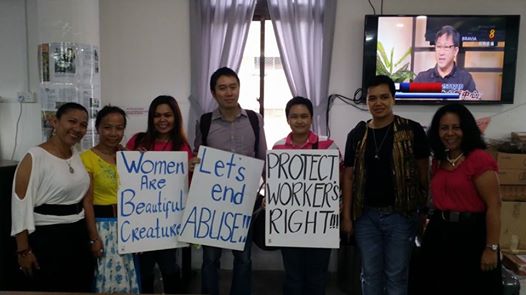“We’re not goods for display,” said Cezile Oyao Revila, a domestic worker leader with HOME.
Al Jazeera recently reported on the unpalatable treatment of domestic workers by employment agencies in Singapore. They were seen mindlessly doing household chores, such as pushing another employee on a wheelchair, outside the agencies. Advertisement collaterals flashed promotions of these workers on “special discounts”, suggesting that they were commodities to be traded.
HOME organized a forum to discuss these issues. The event kicked off with Jolovan Wham, executive director of HOME, showing these pictures taken at Katong Shopping Mall and Bukit Timah Centre. As he presented on the pictures, resounding ‘yes’ from the floor could be heard. Most of the people who attended the forum were domestic workers.
The parading of domestic workers outside the office is strictly prohibited, Ms K Jayaprema, who was one of the speakers at the forum stated clearly in her speech. In her capacity as the President of the Association of Employment of Agency (AEA) in Singapore, she authoritatively specified that advertising materials should not refer to promotional rates, fees, and racial stereotypes of workers. Every week, the AEA submits unsavoury pictures to the Ministry of Manpower (MOM).
But how should these agencies that parade and display domestic workers be punished? Ms Anja Wessels, a research consultant with HOME, also asked if anything could be done to encourage agencies to adhere to good standards.
AEA responded that the agencies will receive demerit points and could lose their licenses if they disobey regulations. Ms Jayaprema’s main point is that to help themselves – domestic workers have to choose accredited agencies. They must go through licensed agencies listed on their embassy website and observe those rules. By doing so, the embassies would have the authority to punish employment agencies that flout regulations and mistreat workers.
Directing it to the domestic workers, Ms Jayaprema said, “you’re not forced into it, you have a choice.”
Despite her emphatic reassurance, Ms Shelly Teo from TWC2, disagreed. What Ms Jayaprema said does not square with reality. Ms Shelly pointed to incidents when passports of domestic workers were withheld even though MOM’s regulations prohibit such behaviour. Once that happens, they are left with no choice but to comply with the demands of employment agencies.
Moreover, there were cases when employees faced contract substitution. Upon arrival in Singapore, they were given another contract to sign after having signed one in agreement with the recruitment agency back home. Once domestic workers have been employed, they are unable to change employers on their own will; employers hold the power to make this decision. The lack of freedom of mobility restricts domestic workers from making choices. They are working in poor conditions and regulations do not provide adequate protection.
First secretary Ms Htwe Hteik Tin Lwin at the Myanmar embassy, Sukmo Yuwono, counsellor at Indonesian embassy and Vicente Cabe, labour attaché at the Philippines embassy who were speakers at the forum recapped their country’s regulations. They largely differ in terms of pay structure and mandates on agency fees. Their presence provided the opportunity for domestic workers to air their concerns.
High agency fees dominated the discussion. Agency fees up to eight months of the workers’ salary was charged to the workers at times, although only up to two months of deduction is allowable under MOM’s regulations.
Ms Jayaprema reemphasized the importance of working for licensed employment agencies, and that the workers have a choice to make the right decision starting from when they have decided to embark on this job.
“It starts from home,” Ms Jayaprema said.
Another issue raised has to do with the extra costs required to secure their worker insurance. Domestic workers are required to purchase insurance worth about Rp. 300,000. The workers have to return home every two years to renew the card.
However, only selected cities provide the service. As the location is inaccessible, the workers would have to travel for a day just to make the card. Enok Sunani, an Indonesian worker, said that she spends her precious vacation on the road and away from her family, again.
The local insurance company does not compensate the traveling costs. If they fail to renew the card, they are disallowed to cross the customs in Indonesia, unless they pay ‘special fees’ – and even if, fortuitously, they happen to do so, leaving Singapore’s customs would be impossible.
Mr Sukmo Yuwono replied that only their colleagues in Indonesia are able to deal with this problem.
Though answers were not always satisfactory, the forum provided a space for authorities, domestic workers, employers, and interested parties to engage with each other in a dialogue. It was a precious opportunity to understand one another’s views. The forum concluded with a dance number by HOME Nightingale who held out placards reminding us to ‘protect workers’ rights’.

